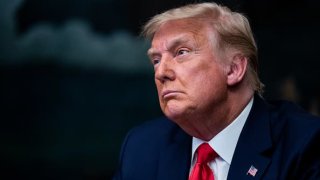
- Stimulus checks of $600 per person were criticized by President Donald Trump on Tuesday.
- Trump called the payments "ridiculously low" and insisted on $2,000 per person instead.
- But Trump's initiative could be rejected by members of his own party, who have vowed to try to keep the total cost of the bill down.
As Congress moves to finalize a new round of coronavirus relief funding, President Donald Trump threw a wild card into the negotiations on Tuesday — a demand for $2,000 stimulus checks per individual.
Currently, the bill provides for $600 per person, or $1,200 per married couple, plus $600 for children under 17.
"I am asking Congress to amend this bill and increase the ridiculously low $600 to $2,000, or $4,000 for a couple," Trump said in a video released on Tuesday.
Democrats, who have fought for higher $1,200 payments, agreed.
"Democrats are ready to bring this to the Floor this week by unanimous consent. Let's do it!" House Speaker Nancy Pelosi, D-Calif., tweeted in response.
Getting approval for those higher payments could be easier said than done.
Money Report
Total cost a major factor
The $600 checks make up about $166 billion of the total $900 billion package. Estimates from the Tax Foundation indicate the payments would cost $174 billion in federal revenue.
Raising the amount of the second stimulus checks to $2,000 would bring the total cost of the bill up. Exactly how much would depend on the terms of the payments, and whether the $2,000 sums would also apply to dependents.
If it is $2,000 per adult and $600 per dependent, the cost could be roughly $500 billion, according to Bill Hoagland, senior vice president at the Bipartisan Policy Center. That could bring the bill's total to $1.24 trillion, a level of spending Republicans have previously rejected.
The $2,000 checks could cost between $500 billion to $600 billion, depending on the final details, according to an estimate from Alex Anderson, policy research associate at Raymond James.
Trump did also ask Congress to eliminate "wasteful and unnecessary items," though it is unclear how much that would save.
The plan for the $600 checks is a compromise between lawmakers who want second $1,200 payments and others who say the checks are not an effective way of targeting people who are suffering due to the pandemic.
How the idea could be rejected
Last week, there was a showdown on the Senate floor when Sens. Bernie Sanders, I-Vt., and Josh Hawley, R-Mo., separately asked for up-or-down votes for their proposals for $1,200 direct payments similar to those made under the CARES Act.
Both times, the moves were rejected by Sen. Ron Johnson, R-Wis., who cited concerns about the deficit.
A similar story could play out this week.
The House will attempt to pass a bill with $2,000 payments on Thursday by unanimous consent.
That would be rejected if just one Republican votes no.
What's more, some Senate Republicans also likely won't be willing to approve the higher payments, though Hawley tweeted his support for Trump's proposal.
"It would just not fly in the Senate," Hoagland said.
Such a move will put "Republican lawmakers on defense," Ed Mills, Washington policy analyst at Raymond James, wrote in an analyst note.
"The Georgia Senate races are the target here, as Republicans will be forced to defend a 'no' vote on the increased payments days before the Jan. 5 runoff vote," Mills said.
"Delay of the COVID relief bill and the $600 payments would provide a further offensive opportunity for Democrats against Republican Sens. [Kelly] Loeffler and [David] Perdue," he said.
Exactly how soon any payments go out — whether it's $600 or $2,000 — will depend on how long it takes for Congress and Trump to agree.
Treasury Secretary Steven Mnuchin said this week that direct payments could go out starting early next week. Now, however, that will be on hold until a deal is finalized.






